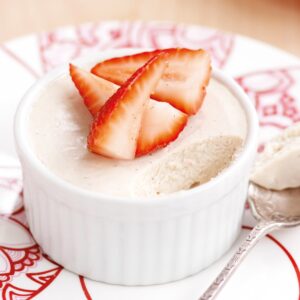
There's 325mg of calcium in a cup of 'light blue' milk. But what if you can't drink milk? Don't panic – nutritionist Lisa Yates has plenty of ways to boost bone health.
Calcium, the bone-strengthening mineral, is important at every age.
Daily calcium needs
| Who? | Age | Amount |
| Children | 1-3 yrs 4-8 yrs |
500mg 700mg |
| Boys and girls | 9-13 yrs 14-18 yrs |
1000-1300mg 1300mg |
| Women | 19-50 yrs Over 50 |
1000mg 1300mg |
| Men | 19-70 yrs Over 70 |
1000mg 1300mg |
How much calcium?
Almonds
These crunchy nuts have the highest calcium content of all the nuts. Just a quarter cup provides around 100mg calcium.
1/4 cup almonds = same calcium as 1/3 cup milk
Broccoli
As well as an antioxidant boost, adding one cup cooked broccoli to your dinner vegetables also provides 60mg calcium.
1 cup cooked broccoli = same calcium as 1/5 cup milk
Calcium-fortified breakfast cereals
Cereals aimed at women tend to have calcium added. One 30g serve of Kellogg's Special K, for example, will give you 200mg calcium – and that's before adding milk.
30g serve Special K = same calcium as 5/8 cup milk
Chinese cabbage
This leafy vegetable is great in stir-fries. Three-quarters cup cooked cabbage gives 100mg calcium.
3/4 cup cooked Chinese cabbage = same calcium as 1/3 cup milk
Dried fruit
Drying fruit concentrates the nutrients they contain, including calcium. One-third cup as a snack gives around 40mg calcium.
1/3 cup dried fruit = same calcium as 1/8 cup milk
Legumes
Beans, such as borlotti or haricot beans, contain small amounts of calcium so add half a cup to soups and stews and get around 60mg calcium.
1/2 cup legumes = same calcium as 1/5 cup milk
Oysters, mussels, clams
These creatures filter sea water to get their food – accumulating minerals, such as calcium, in the process. Try a dozen raw oysters for a 125mg calcium boost.
12 raw oysters = same calcium as 2/5 cup milk
Rhubarb
Just half a cup stewed of rhubarb will give you 115mg calcium.
1/2 cup stewed rhubarb = same calcium as 3/4 cup milk
Sardines
These fish are calcium-rich – only 100g (around one small tin) sardines gives you 225mg. They're a source of vitamin D, too, which helps you absorb calcium.
One small tin sardines = same calcium as 3/4 cup milk
Seaweed
Sea water contains many minerals, which is why seaweed does, too. Half a cup of raw seaweed contains 50mg calcium, so order a seaweed salad or sushi when eating Japanese.
1/2 cup raw seaweed = same calcium as 1/6 cup milk
Silver beet
Three-quarters cup cooked silver beet contains 90mg calcium.
3/4 cup cooked silver beet = same calcium as 1/3 cup milk
Soy beverages
Soy milk is naturally low in calcium so extra calcium is usually added. It is a good alternative to dairy if you are allergic or lactose intolerant. One cup calcium-fortified soy milk will have the same amount as cow's milk.
1 cup calcium-fortified soy milk = same calcium as 1 cup milk
Tahini spread
Smear a heaped tablespoon of this sesame seed paste on sandwiches for around 75mg calcium.
1 heaped tablespoon tahini spread = same calcium as 1/4 cup milk
Tofu or bean curd
Calcium is often used to thicken the soy milk used to make tofu. When you're buying tofu, look for 'calcium-precipitated' or for 'calcium sulfate' on the label. Just 100g in your next stir-fry will give you 200mg of calcium.
100g tofu = 1/2 cup milk
Treacle
Treacle is surprisingly rich in calcium: just 1 tablespoon has around 100mg, the same as one third-cup milk. Add this golden sweetener to your pancakes or other cakes.
1 tablespoon treacle = same calcium as 1/3 cup milk
www.healthyfood.com










